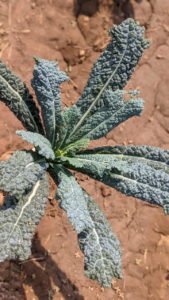Jajpur: Exotic vegetables like zucchini and bok choy (Chinese cabbage) have become commonplace on supermarket shelves nowadays. In keeping with the times, Lalbahadoor Mohanta, a progressive farmer from the rural hamlet of Ranagundi, has successfully introduced the cultivation of exotic vegetables in Jajpur district.
Earlier, he cultivated only rice and some vegetables like cabbage, cauliflower, tomato, potato, and fruit orchard. This farming practice provided good returns only to meet out the family expenses. Now, others look up to him as an expert in alternative farming practices apart from garnering extra profits.
Mohanta had attended an organic farming workshop in 2018 in Bhubaneswar where an agritech startup showcased a sustainable low-cost farming model for exotic vegetable cultivation in Odisha. He showed interest in starting the same in his farmland. With help from the startup on technical support, input supply and assured market linkage, marketing and input supply, he began planning how he would go about doing it.
Following research, he began with cultivating cherry tomato from September last year. “It came out very well and the produce was sold back to the startup in a buyback mode,” he adds.
At present, he grows three varieties of tomatoes apart from zucchini, kale and bok choy (Chinese cabbage) and has earned a profit of around Rs. 51, 000.

Mohanta is also the first farmer in the region to have successfully grown and harvested high-value purple sweet potatoes in the heat of mid-April, a feat that is unheard of in a state where sweet potatoes are a rain-fed crop with winter harvest.
“I do the cultivation in intercropping mode ensuring no wastage of farming lands. I have around 25 decimal of land and I ensure that I make the maximum use of it throughout the year,” he says.
He has motivated several farmers for growing such vegetables for higher economic returns. Now, he is an inspiration for the farmers of the area. He has also shared the planting material with fellow farmers so that they can try it on their land on pilot mode.

Farmers and agriculture experts from distant places have visited his field and appreciated the practice of growing exotic vegetables in such a remote village. “I want more and more farmers to get into the field because bulk cultivation will bring us to notice leading to more returns,” he says.
“Till now, exotic vegetables and agricultural products could not be grown locally because they need specific climatic conditions. They had to be sourced from far-off regions, hence, they are expensive and are used only in the preparation of gourmet meals. We need to change that mindset and it will only be possible when there is an ecosystem of farmers who grow these vegetables. It will not only help us gain more returns but also ensure that the consumers get these products at a cheaper rate,” sums up Mohanta.


